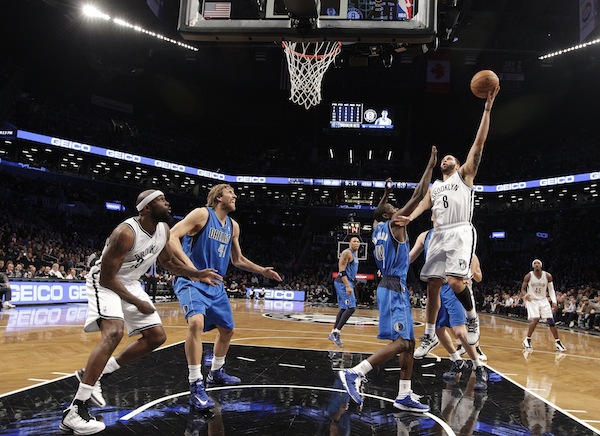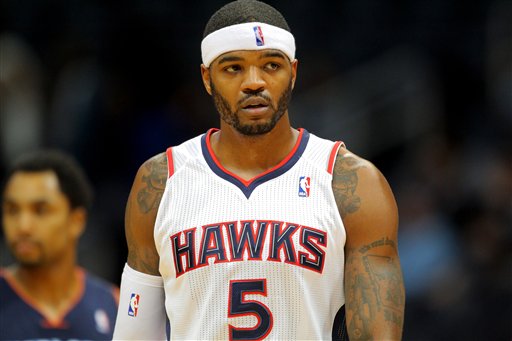As I recovered from my post-Derrick Coleman/Kenny Anderson-induced melancholy, the Nets drafted a lanky, speedy kid from Villanova University in 1996 who quickly became my then-favorite player. I knew Kerry Kittles well from his play in the Big East Conference. Granted Allen Iverson and Ray Allen were the sexier names from the conference in the 1996 Draft class, but the Nets were an organization that had been missing that sharp-shooting, defensive-minded SG ever since Drazen Petrovic died. When mock drafts predicted that Kittles would be the Nets likely pick, I passionately rooted for that outcome, hoping the team wouldn’t be seduced by the bigger unknown quantity in Kobe Bryant (who, rumor has it, was supposed to be drafted by the Nets but John Calipari was inevitably talked out of it).
Granted, it wouldn’t take long for hindsight to prove that the Nets blew yet another opportunity – imagine what they could have done with Bryant all these years (my guess is there would have been at least a few NBA championships in New Jersey)? But despite the front office’s massive miscalculation, I’ll never hold it against Kittles, who quietly evolved into one of the greatest Nets of all-time.
Kittles never put up the flashy numbers of a Rick Barry, and never carried a team on his back the way Vince Carter and Drazen Petrovic did, but Kittles essentially survived two different eras of Nets basketball during his time in NJ. Despite fighting chronic knee problems that cost him his 2000-01 season and took out chunks of numerous other seasons, Kittles was a model of consistency and stability over the course of his seven seasons unsurpassed by anyone else on this list. Yes, I’m essentially praising a player for being perfectly acceptable offensively – 13-15 points a game, a few steals, 35-40 percent shooting from three – because he did it over a comparatively longer period of time and because the guy never did anything to shame himself or the franchise. When you’re talking about the Nets and their history of busted potential, too-short-term dances with glory, or just out-and-out head cases, Kittles stands about as far apart from that group than almost anyone else.
And for the record, it’s not like Kittles was a bad player either. During his sophomore campaign, while Keith Van Horn got the headlines, and Jayson Williams made the all-star team, Kittles put up a 17.2 ppg, 42 3P% season, all while playing steady defense and taking care of the ball. Of course, his frail frame made him susceptible to injury, and maybe the prodding of a certain coach who I’ve vowed to despise for the remainder of hoops-fandom led to his body breaking down more than it should have:
“Here’s what it is,” Calipari said. “The question is: Do you want to be a nice two guard, or do you want to be a special player? The only way he can be special, and I believe he will be special, is if you’re mentally and physically tough enough to get to the playoffs, to make big plays. You have to make dagger shots, have the mentality of a killer.”
 And here’s what happened – while Jason Kidd (deservedly) gets the bulk of the credit for the Nets playoff run during the 2001-02 and 02-03 seasons, the Nets may have never even escaped the first round of the playoffs in ’02 without a “dagger” shot from Kittles. After losing Game 1 against the Pacers at home, the Nets needed to take a game at the Conseco Fieldhouse in Indiana in order to prove that their surprisingly magical regular season was not all for naught. After being tortured by Reggie Miller throughout the game, and essentially being benched by coach Byron Scott for the bulk of the fourth quarter, Kittles went back in with about 5 minutes to play and with 22.5 seconds, hit a three-pointer that put the Nets up 4, enough of a cushion to survive yet another last-second push by Miller.
And here’s what happened – while Jason Kidd (deservedly) gets the bulk of the credit for the Nets playoff run during the 2001-02 and 02-03 seasons, the Nets may have never even escaped the first round of the playoffs in ’02 without a “dagger” shot from Kittles. After losing Game 1 against the Pacers at home, the Nets needed to take a game at the Conseco Fieldhouse in Indiana in order to prove that their surprisingly magical regular season was not all for naught. After being tortured by Reggie Miller throughout the game, and essentially being benched by coach Byron Scott for the bulk of the fourth quarter, Kittles went back in with about 5 minutes to play and with 22.5 seconds, hit a three-pointer that put the Nets up 4, enough of a cushion to survive yet another last-second push by Miller.
”For this franchise and for this season the way we’ve been playing, that was the biggest shot that I’ve been associated with,” Scott said after the game. ”That was the biggest shot that I’ve seen in a long, long time.”
You have to wonder what Nets basketball would have been like in the early 2000s without that Kittles shot. If the Nets lose Game 3, they likely lose the series and all of the talk the subsequent season would have centered on a young, inexperienced team, with a talented yet combustible point guard, being unable to rise to the occasion when it mattered most. And it was the guy who survived, Calipari, Don Casey, Stephon Marbury, the shockingly disappointing 1999 season, and a debilitating knee injury who delivered for the Nets. How can he not be regarded as a bit of a folk hero, even as Kobe enters the “greatest of all-time” debate?
When the Nets went into yard sale mode after the 2003-04 season, people looked to the departure of Kenyon Martin as the heart and soul of the Nets being gutted, but I didn’t become truly disenchanted as a fan until the team unload Kittles to the Clippers for cash and a couple of deflated basketballs and broken rims. While Kmart was a lynchpin, I could understand not wanting to give him the money he wanted and as time wore on, and Martin’s knee issues became chronic, the Nets were vindicated by that decision. But Kittles, despite having an injury plagued season after he left the Nets himself, should have retired as a Net. The fact that he’s working in the organization’s front office proves his commitment to the organization. My guess is after their respective retirements, Kidd or Martin will not be visiting high schools in Newark with Billy King. Kittles never faked a migraine, demanded a max salary, taped “trade me” on his sneakers, or had his car break down on a weekly basis on his way to practice. Instead, he has always been committed to being a Net, and for that, he will always be a team legend in my mind.

















